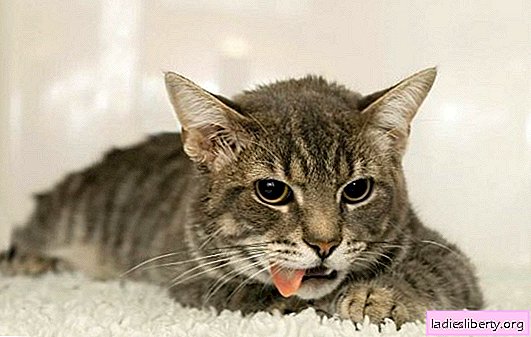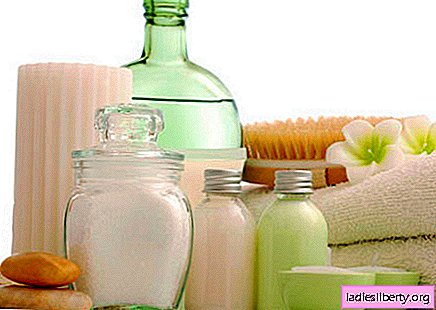
The pet requires constant care, especially provided that the little friend is very small. Particular attention of the owner of the kitten should be paid to his behavior and well-being.
If your pet is sick and sick, you should find out the reasons for the kitten vomiting. It is necessary to do this immediately, since an unformed organism can thus respond to quite serious pathologies that require the intervention of a veterinarian.
Possible causes of vomiting in a kitten
It is sometimes impossible to determine the cause of vomiting of your pet yourself. Despite this fact, the owner should make an attempt to clarify the poor health of the kitten. There are several reasons why a kitten could vomit.
1. A sharp transition to a different diet. A good example is the case when a one-month-old baby was torn from a mom-cat and transferred to full feeding. Due to the fact that the kitten’s body is not yet fully developed, and its digestive system has not yet become stronger, the baby is not able to digest the food received.
2. Wrong components of the diet. Eating foods that are unhealthy for your pet’s health: poor quality food, fatty fried foods that people eat will lead to problems with the digestive system.
3. Excessive amount of food.
4. The ingress of animal hair into the gastrointestinal tract.
5. Ingestion of foreign objects into the digestive system (if the pet has swallowed something inedible).
6. Poisoning by any chemicals.
7. The presence of parasites - worms.
8. Impaired liver function.
9. Ingestion of an infection.
The listed reasons that the kitten vomited apply only to those babies who feed on their own (excommunicated). Provided that the pet is still feeding on mother’s milk, harmful components also get together with the beneficial substances in its composition. This is possible if the cat mother is given any pills for treatment.
Not all reasons are a serious cause for concern and threaten the body of a kitten. But only a specialist can determine the cause, and how it will affect the baby’s health.
What to do if a kitten vomits
Each owner, whose pet is experiencing a similar problem, asks the question - what to do if the kitten vomited, how to provide first aid?
If vomiting is repeated frequently, each is accompanied by vomiting, the body temperature is changed, the kitten vomits with yellow or white liquid for several hours, blood droplets in the discharge are possible and there is a complete rejection of food and water, then only a veterinarian can help.
After carrying out the tests, the veterinarian will prescribe therapeutic therapy, which includes the following treatment methods and drugs.
1. Antiemetics.
2. To eliminate spasms and pain, pain medication is used.
3. With a lack of fluid in the body, salt solutions are necessary.
4. Provided that the cause of vomiting is the spread of infection, antibiotics are prescribed, which will be used as injections into the muscles.
5. If worms were discovered by a veterinarian, anthelmintic drugs are prescribed accordingly.
What to do if the kitten vomited only once, and other symptoms of serious pathologies or poisoning are not observed? In this case, the owner of the pet will be able to provide first aid on their own. It is advisable not to feed your pet for half a day (about 12 hours). Every one and a half to two hours you should water the kitten with clean water. If the pet’s age is very small, a needle-free syringe can help.
After the kitten's health improves, he will begin to “come to life” and show an inherent interest in the environment and food, it is worth giving him a small amount of food. You can feed your little friend low-fat chicken, broth, rice broth or a specialized medicinal food. After a day, you can return the usual diet. It is imperative to exclude products harmful to the baby’s health - smoked, fatty, sweet, salty.
It is important to remember that for any reason of vomiting, you should not load the kitten’s gastrointestinal tract with food, but let him rest for 12-14 hours.
Preventative measures
In order to prevent the occurrence of such an unpleasant phenomenon as vomiting, your pet should observe a few rules.
1. Provided that the kitten eats cat's milk, it is necessary to carefully monitor what it eats and try to keep its immune system in good condition.
2. When transferring from liquid feed to solid, it is advisable to carry out the process gradually.
3. Be sure to timely vaccination and deworming, in order to avoid infection with infections or parasites.
4. Careful monitoring of the baby so that it can eliminate the ingress of a foreign object or harmful chemicals into its digestive system.
5. Preventive examination by a veterinarian every six months.
6. Proper diet.
7. Exclusion from the diet of unhealthy baby foods.
We should not forget that the less the pet’s age, the less likely it is that the use of medications or other treatments will be successful. Negligence of the owner of the kitten or the attending veterinarian can lead to death (especially for pets under the age of 2 months).
A careful attitude of the owner to the pet will help maintain the health of the baby and prevent the occurrence of an adverse symptom - vomiting. Also, timely contact with a veterinarian when this symptom is detected will help improve the condition of the kitten and accelerate the recovery period.











